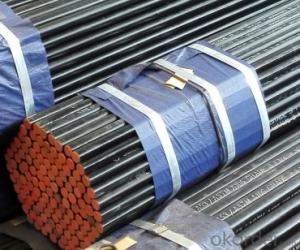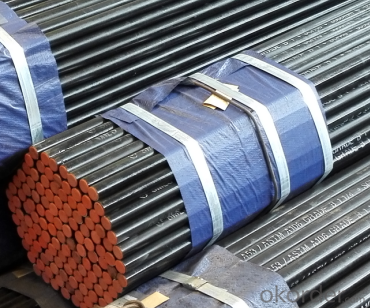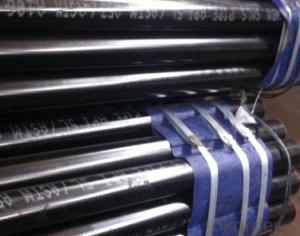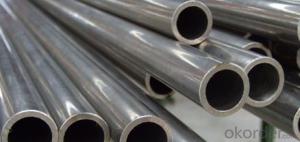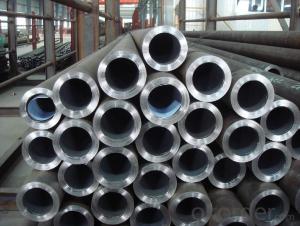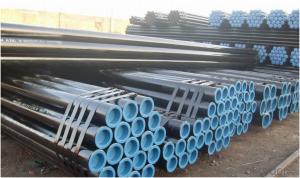Carbon Smls Steel Pipe Api 5l/ Astm /A106 A53/ Gr.B Psl1
- Loading Port:
- Tianjin
- Payment Terms:
- TT or LC
- Min Order Qty:
- 50 m.t.
- Supply Capability:
- 1000 m.t./month
OKorder Service Pledge
OKorder Financial Service
You Might Also Like
1、Structure of Carbon Smls Steel Pipe Api 5l/ Astm /A106 A53/ Gr.B Psl1:
Seamless pipe is formed by drawing a solid billet over a piercing rod to create the hollow shell. As the manufacturing process does not include any welding, seamless pipes are perceived to be stronger and more reliable. Historically seamless pipe was regarded as withstanding pressure better than other types, and was often more easily available than welded pipe.
2、Main Features of Carbon Smls Steel Pipe Api 5l/ Astm /A106 A53/ Gr.B Psl1:
• High manufacturing accuracy
• High strength
• Small inertia resistance
• Strong heat dissipation ability
• Good visual effect
• Reasonable price
3、Carbon Smls Steel Pipe Api 5l/ Astm /A106 A53/ Gr.B Psl1 Specification:
Standard | GB, DIN, ASTM ASTM A106-2006, ASTM A53-2007 |
Grade | 10#-45#, 16Mn 10#, 20#, 45#, 16Mn |
Thickness | 8 - 33 mm |
Section Shape | Round |
Outer Diameter | 133 - 219 mm |
Place of Origin | Shandong, China (Mainland) |
Secondary Or Not | Non-secondary |
Application | Hydraulic Pipe |
Technique | Cold Drawn |
Certification | API |
Surface Treatment | factory state or painted black |
Special Pipe | API Pipe |
Alloy Or Not | Non-alloy |
Length | 5-12M |
Outer Diameter | 21.3-610mm |
Grade | 20#, 45#, Q345, API J55, API K55, API L80, API N80, API P110, A53B |
Standard | ASME, ASTM |
1) Material:20#(ASTM A 106/A53 GRB.API5LGRB,GB),45#,16Mn,10#.
2) Specification range:OD:21.3-610mm,WT:6-70mm,length:6-12m or according to the requirement of clients.
3) Excutive standards:GB,ASME API5L.ASTM A 106/A53,Despite of the above standards,we can also supply seamless steel pipe with standard of DIN,JIS,and so on,and also develop new products according to the requirements of our clients!
4) Surface:black lacquered,varnish coating or galvanized.
5) Ends:Beveled or square cut,plastic capped,painted.
6) Packing:bundles wrapped with strong steel strip,seaworthy packing.
4、Packaging & Delivery of Carbon Smls Steel Pipe Api 5l/ Astm /A106 A53/ Gr.B Psl1:
Packaging Details: | seaworthy package,bundles wrapped with strong steel strip |
Delivery Detail: | 15-30days after received 30%TT |
5、FAQ of Carbon Smls Steel Pipe Api 5l/ Astm /A106 A53/ Gr.B Psl1:
①How is the quality of your products?
Our products are manufactured strictly according to national and internaional standard, and we take a test
on every pipe before delivered out. If you want see our quality certifications and all kinds of testing report, please just ask us for it.
Guaranteed: If products’ quality don’t accord to discription as we give or the promise before you place order, we promise 100% refund.
②How about price?
Yes, we are factory and be able to give you lowest price below market one, and we have a policy that “ for saving time and absolutely honest business attitude, we quote as lowest as possible for any customer, and discount can be given according to quantity”,if you like bargain and factory price is not low enough as you think, just don’t waste your time.Please trust the quotation we would give you, it is professional one.
③Why should you chose us?
Chose happens because of quality, then price, We can give you both.Additionally, we can also offer professional products inquiry, products knowledge train(for agents), smooth goods delivery, exellent customer solution proposals.Our service formula: good quality+good price+good service=customer’s trust
SGS test is available, customer inspection before shipping is welcome, third party inspection is no problem.
6、Carbon Smls Steel Pipe Api 5l/ Astm /A106 A53/ Gr.B Psl1 Images:
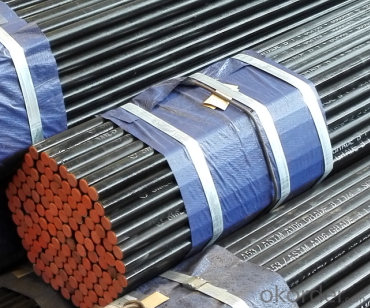
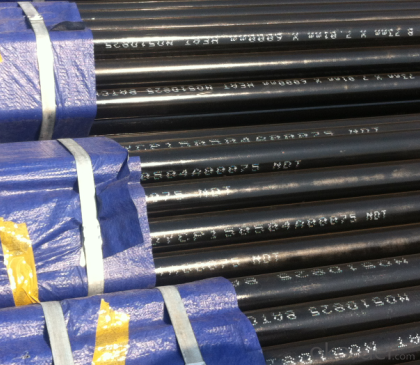
- Q: What material is RHS in the steel tube?
- The CHS structure represents thin-walled round steel tubes, in which materials are referred to Taiwan CHS's steel and are used to indicate the series of anti rust paints used in metal materials.
- Q: How are steel pipes measured and specified?
- Several key parameters are used to measure and specify steel pipes. These parameters include the outer diameter (OD), wall thickness, and length of the pipe. The outer diameter is the measurement of the pipe's outside surface from one end to the other. It is typically expressed in millimeters or inches and plays a critical role in determining the pipe's strength and carrying capacity. Different applications require different OD sizes, which can range from a few millimeters to several feet. The wall thickness refers to the distance between the pipe's outer and inner surfaces. It is measured in millimeters or inches and is crucial for determining the pipe's durability and resistance to pressure. Thicker walls can handle higher pressure, making them suitable for applications that require transporting liquids or gases under high pressure. Steel pipes are generally specified in meters or feet for their length. Standard pipe lengths are often 6 or 12 meters (20 or 40 feet), but custom lengths can be requested based on project requirements. It is important to note that longer pipes may require additional support to prevent sagging or structural issues. In addition to these primary measurements, steel pipes may also be specified based on other factors such as material grade, manufacturing standard, and surface finish. Material grade refers to the quality and composition of the steel used in the pipe, determining its strength and corrosion resistance. Manufacturing standards, such as ASTM or API, ensure that the pipes meet specific quality and performance criteria. Surface finish specifications may include factors like galvanized coating, providing protection against corrosion or other specific requirements based on the intended application. Overall, the measurement and specification of steel pipes involve considering the outer diameter, wall thickness, length, material grade, manufacturing standard, and surface finish. These parameters are crucial in determining the suitability of the pipe for various applications and ensuring its performance and durability in different environments.
- Q: Difference between cold rolled steel pipe and common steel pipe
- From the above point of view, the hot rolled steel pipe used in fluid transport, mechanical structure and other requirements of the size of the situation is not high, cold-rolled steel pipe used in precision instruments, hydraulic systems, pneumatic and other places demanding.
- Q: What are the different methods of measuring the thickness of steel pipes?
- There are several methods of measuring the thickness of steel pipes, including ultrasonic testing, magnetic particle testing, eddy current testing, and laser scanning.
- Q: Can steel pipes be used in high-pressure applications?
- Yes, steel pipes can be used in high-pressure applications. Steel pipes are known for their strength and durability, making them suitable for handling high-pressure fluids or gases in various industries such as oil and gas, chemical processing, and power generation. They are designed to withstand the stress and pressure exerted on them, ensuring reliable performance and safety in high-pressure environments.
- Q: Can steel pipes be used for wastewater treatment facilities?
- Yes, steel pipes can be used for wastewater treatment facilities. Steel pipes are commonly used in wastewater treatment plants due to their durability, strength, and resistance to corrosion. They can efficiently transport and distribute wastewater throughout the facility, ensuring its proper treatment and disposal. Additionally, steel pipes can withstand the harsh conditions and chemicals often present in wastewater treatment processes, making them a reliable choice for this application.
- Q: What is the difference between steel pipes and aluminum pipes?
- The main difference between steel pipes and aluminum pipes lies in their composition and properties. Steel pipes are made of an alloy of iron and carbon, which provides them with excellent strength and durability. They are often used in applications that require high-pressure or extreme temperatures. On the other hand, aluminum pipes are composed of aluminum, a lightweight metal that offers good corrosion resistance. Aluminum pipes are commonly used in industries where weight is a concern, such as aerospace and automotive. Overall, the choice between steel and aluminum pipes depends on the specific requirements of the application.
- Q: How do steel pipes perform in marine environments?
- Steel pipes perform well in marine environments due to their high corrosion resistance. They are typically coated with protective layers such as zinc or epoxy, which further enhance their ability to withstand the harsh conditions of saltwater, waves, and constant exposure to moisture. These pipes are capable of withstanding the corrosive effects of seawater, making them reliable for various applications like offshore oil rigs, shipbuilding, and coastal infrastructure.
- Q: What industries typically use steel pipes?
- Steel pipes find widespread use across various industries due to their durability, strength, and versatility. Some of the sectors that typically employ steel pipes include: 1. Construction: Steel pipes are extensively utilized in the construction industry for diverse purposes like structural support, plumbing, and underground piping systems. They are commonly seen in commercial buildings, residential structures, bridges, and tunnels. 2. Oil and gas: The oil and gas industry heavily relies on steel pipes for drilling, transporting, and distributing oil and gas. Steel pipes are employed in offshore drilling rigs, oil refineries, natural gas processing plants, and pipelines to ensure the safe and efficient transport of these valuable resources. 3. Water and wastewater: Steel pipes play a crucial role in providing clean water supply and managing wastewater. They are used in water treatment plants, desalination facilities, and municipal water distribution systems. Steel pipes are also essential for sewage and stormwater management. 4. Manufacturing: Various manufacturing industries employ steel pipes for specific applications. For example, automobile manufacturers use steel pipes in exhaust systems, fuel lines, and hydraulic systems. Steel pipes are also utilized in the production of machinery, equipment, and appliances. 5. Mining: The mining industry requires robust and enduring materials for its operations. Steel pipes are used in mining applications such as conveying materials, ventilation systems, and underground infrastructure. They prove particularly useful in transporting minerals, ores, and other mining byproducts. 6. Energy and power: Steel pipes find extensive use in power generation facilities, including thermal power plants, nuclear power plants, and renewable energy installations. They are employed in steam pipelines, cooling systems, and heat exchangers. Steel pipes are also used in the construction of transmission lines for electricity distribution. 7. Infrastructure and transportation: Steel pipes are essential for infrastructure development and transportation systems. They are used in the construction of roads, bridges, railways, and airports. Steel pipes also play a role in the transportation of fluids and gases, such as in natural gas or petroleum product pipelines. Overall, the versatility and dependability of steel pipes make them indispensable in a wide range of industries, contributing to various aspects of our modern infrastructure and daily lives.
- Q: How do you prevent steel pipes from freezing?
- To prevent steel pipes from freezing, there are several measures you can take: 1. Insulate the pipes: Use foam insulation sleeves or wrap the pipes with insulation tape. This will help maintain the temperature of the pipes and prevent them from freezing. 2. Seal any gaps or cracks: Inspect the area around the pipes and seal any gaps or cracks with caulk or expanding foam. This will prevent cold air from entering and freezing the pipes. 3. Install heat cables: Heat cables can be wrapped around the steel pipes to provide a steady source of heat. These cables can be controlled by a thermostat, ensuring that the pipes stay above freezing temperature. 4. Keep the temperature above freezing: In areas where extreme cold weather is common, it is advisable to keep the indoor temperature above freezing, even if the property is vacant. This will help maintain a suitable temperature for the pipes and prevent freezing. 5. Open cabinets and faucets: In particularly cold weather, open cabinet doors in kitchens and bathrooms to allow warm air to circulate around the pipes. Additionally, allowing faucets to drip slightly can also prevent freezing by keeping water flowing. 6. Drain the pipes: If you are leaving your property unoccupied during freezing weather, it is recommended to drain the pipes completely. This can be done by shutting off the main water supply and opening all faucets until no water remains. This minimizes the risk of freezing and potential damage. Remember, prevention is crucial in protecting steel pipes from freezing. By implementing these measures, you can significantly reduce the risk of frozen pipes and potential costly repairs.
Send your message to us
Carbon Smls Steel Pipe Api 5l/ Astm /A106 A53/ Gr.B Psl1
- Loading Port:
- Tianjin
- Payment Terms:
- TT or LC
- Min Order Qty:
- 50 m.t.
- Supply Capability:
- 1000 m.t./month
OKorder Service Pledge
OKorder Financial Service
Similar products
Hot products
Hot Searches
Related keywords
